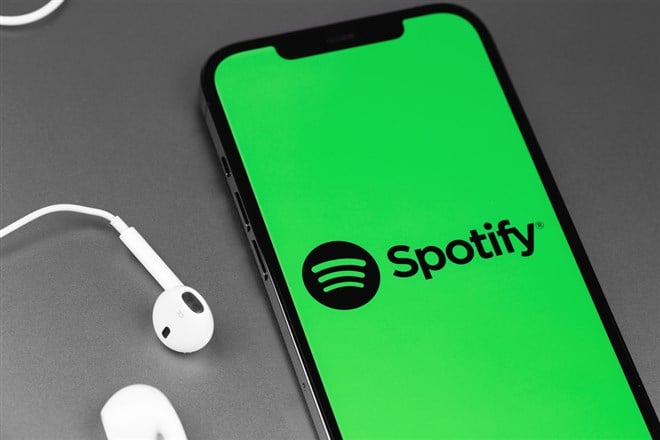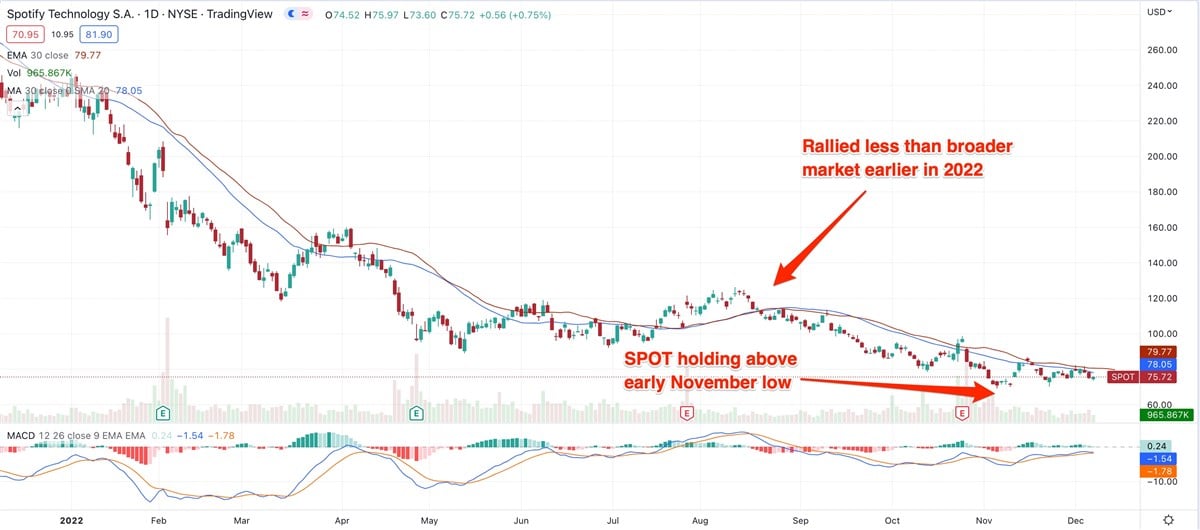
Shares of Spotify Technology SA (NYSE: SPOT) were rebounding Wednesday after declining 4.02% Tuesday.
The stock’s price has held above its November 4 low of $69.29. Does that mean we’ve heard the last of its downtrend?
Spotify attempted a rally in the summer, roughly in tandem with the broader market, but it fizzled and the stock has been trending generally lower, although it’s notched a 5.78% one-month gain.
The streaming audio service is grabbing headlines this week because it rolled out its annual year-end feature called Spotify Wrapped, which compiles user a user’s listenership data for the previous year, categorized by music categories, most listened to, and other designations. The feature was launched in 2016.
Struggled During The Pandemic
Spotify, which went public in April 2018, is based in Sweden. After its IPO, it struggled to regain its 2019 highs, and fell with the rest of the market in early 2020. But Spotify failed to rally along with other streaming stocks, such as Netflix Inc. (NASDAQ: NFLX), which staged a big as subscribers craved at-home entertainment in the early days of the pandemic.
The difference, of course, is that people tend to listen to music and podcasts on their commutes to work, which were eliminated while stay-at-home orders were in place. Usage on most Spotify platforms and devices declined in 2020.
However, Usage on TVs and game consoles increased that year as people listened to music in familiar ways at home: while cooking, doing household chores or spending time with the family.
That undoubtedly helped, but it wasn’t enough to narrow the company’s losses, as there was a net decline in daily active users.
Fast forwarding to 2022, the stock is down 67.60% in the past year and 20.23% on a three-year basis.
Netflix, of course, had its own struggles retaining subscribers and maintaining growth rates as pandemic restrictions faded. Nonetheless, it managed to rally in August, September, and October of 2021, sending it to new highs, while Spotify had a shorter rally and rolled over dramatically after a short-lived rally attempt in November of last year.
Since then, Spotify has trended significantly lower, as the one-year return indicates. 
Underperforming Broader Market
Even as the broader market rallied in October and November of this year, Spotify investors continued hearing the sound of a downtrend.
If the chart wasn’t enough to convince you that Spotify is underperforming relative to the broader market, then it’s worth taking a look at analysts’ views.
Since the company reported its third quarter on October 25, 11 analysts lowered their price targets on Spotify. Nonetheless, MarketBeat data show that analysts have a “moderate buy” rating on the stock with a consensus price target of $151.72, a potential upside of 101.19%.
In the quarter, Spotify had a total of 456 million monthly active users, a gain of 20% from the year-earlier quarter. It reported 195 million paid subscribers, a 13% increase over the same quarter in 2021.
The company lost $0.84 per share on revenue of $2.975 billion. Earnings were below analysts’ estimates, but revenue came in higher than expected.
Advertising Revenue Is Up
Revenue from advertising, an area the company has targeted for growth, increased 19% from the year-ago quarter and constituted 13% of total sales.
Spotify said most of the advertising growth came on the podcasting side of the business. year over year and made up 13% of total revenue. Spotify rolled out podcasts in 2015. More recently, it added audiobooks and has ramped up those offerings quickly.
It’s pretty clear that digital streaming platforms of various kinds represent the future of audio content consumption. However, Spotify isn’t the only show in town. Despite seeing room for upside, analysts’ reduced price targets for the next 12 to 18 months show a degree of dampened enthusiasm that the company has what it takes to generate excess returns.
Whenever you see that, ask yourself whether you are willing to incur the opportunity cost of owning a particular stock, or are you more likely to get a higher return elsewhere. That question is certainly relevant where Spotify is concerned.
